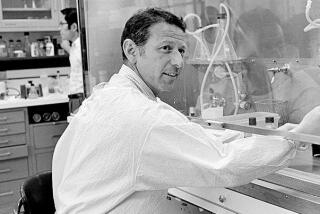Dean Burk, Supporter of Laetrile, Dies
Dean Burk, a prize-winning biochemist at the National Cancer Institute who was rebuked by agency officials for his outspoken support of the controversial cancer treatment Laetrile, died at the home of his daughter in Washington. He was 84.
Burk, who succumbed Thursday to cancer, had been a staff member of the Bethesda, Md., institute for more than three decades. He headed the cytochemistry section, which deals with the chemistry of cells, and retired in 1974 to become president of his own foundation.
While at the institute, Burk called on federal health officials to give Laetrile a fair trial. The drug, while legally available in Mexico and some other countries, was banned by the U.S. Food and Drug Administration and was considered quackery by many of Burk’s fellow scientists.
Burk said in 1973 that he considered Laetrile “in front right now as a treatment for cancer” and he urged that it be tested on humans who gave their consent.
Given a Rebuke
But rankled officials at the institute issued Burk an official reprimand, saying he had the right to exercise his freedom of speech as a private citizen, but he did not represent the government agency.
The institute said that it had tested Laetrile many times with mice and had not be able to establish that the drug had any beneficial effects on tumors.
“I love the National Cancer Institute and even helped to create it,” Burk said, “but I don’t like to see any public servant telling lies to the public. They did get some positive results, much to their surprise and disappointment.”
Laetrile is the purified form of amygdalin, also called vitamin B-17, which occurs naturally in the pits of apricots and in some other foods. The chemical is composed of cynanide, which supporters said killed the cancer cells at the site of the tumor without damaging normal tissues.
Warned of Fluoridation
In later years, Burk also cautioned lawmakers against the fluoridation of water, saying: “One-tenth of all the cancer deaths--one-tenth--can be correlated with the drinking of fluoridated water.”
In 1952, Burk received a prize for his work on photosynthesis, the process by which plants make starch and sugar from air and water with the aid of sunlight, and in 1965 he was awarded a prize for developing procedures that distinguish normal and cancer-damaged cells.
He also was a co-developer of the prototype of the Magnetic Resonance Scanner, an imaging device frequently used instead of X-rays.
Survivors include his wife, Mildred Chaundy Burk.
More to Read
Sign up for Essential California
The most important California stories and recommendations in your inbox every morning.
You may occasionally receive promotional content from the Los Angeles Times.








